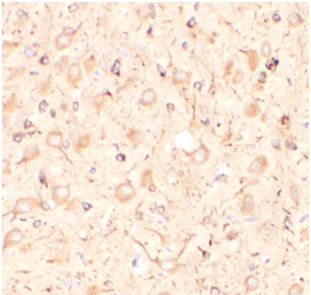Products
Kisspeptin antibody
Category:
- SPECIFICATIONS
- Product Name
- Kisspeptin antibody
- Catalogue No.
- FNab10525
- Size
- 100μg
- Form
- liquid
- Purification
- Immunogen affinity purified
- Purity
- ≥95% as determined by SDS-PAGE
- Clonality
- polyclonal
- Isotype
- IgG
- Storage
- PBS with 0.02% sodium azide and 50% glycerol pH 7.3, -20℃ for 12 months(Avoid repeated freeze / thaw cycles.)
Immunogen
- Immunogen
- KiSS-1 metastasis-suppressor
- Alternative Names
- KiSS 1 antibody, KiSS 1 metastasis suppressor antibody, KISS1 antibody, Kisspeptin 1 antibody, Metastasis suppressor KiSS 1 antibody, metastin antibody
- UniProt ID
- Q15726
Application
- Tested Applications
- IHC
- Recommended dilution
- IHC: 1:20-1:200
Validated Images
 Immunohistochemistry of paraffin-embedded rat brain tissue slide using FNab10525(Kisspeptin Antibody) at dilution of 1:100
Immunohistochemistry of paraffin-embedded rat brain tissue slide using FNab10525(Kisspeptin Antibody) at dilution of 1:100
- Background
- Metastasis suppressor protein in malignant melanomas and in some breast cancers. May regulate events downstream of cell-matrix adhesion, perhaps involving cytoskeletal reorganization. Generates a C-terminally amidated peptide, metastin which functions as the endogenous ligand of the G-protein coupled receptor GPR54. Activation of the receptor inhibits cell proliferation and cell migration, key characteristics of tumor metastasis. Kp-10 is a decapeptide derived from the primary translation product, isolated in conditioned medium of first trimester trophoblast. Kp-10, but not other kisspeptins, increased intracellular Ca(2+) levels in isolated first trimester trophoblasts. Kp-10 is a paracrine/endocrine regulator in fine-tuning trophoblast invasion generated by the trophoblast itself. The receptor is also essential for normal gonadotropin-released hormone physiology and for puberty. The hypothalamic KiSS1/GPR54 system is a pivotal factor in central regulation of the gonadotropic axis at puberty and in adulthood.



